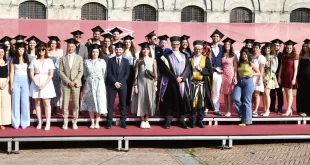Offer Description
| Jagiellonian University in Kraków promotes cooperation and cares for a good atmosphere based on mutual trust. It implements the strategy resulting from The Human Resources Strategy for Researchers, creating stable conditions for employment as well as the development of academic career, which resulted in the award of the HR Excellence in Research by the European Commission |
INFORMATION ON SELECTION PROCEDURE
| Date of selection procedure announcement | Cracow, 20.09.2023 |
| Selection procedure information number given by the Centre for Human Resources | 1227.1101.282.2023 (2) |
| Dean of the faculty of /Director of a non-faculty, inter-faculty or common unit | Head of Malopolska Centre of Biotechnology
Dr Danuta Earnshaw Mossakowska, prof. UJ |
| Address | Małopolska Centre of Biotechnology
ul. Gronostajowa 7A, 30-387 Cracow |
RECTOR
of the Jagiellonian University
announces a selection procedure for the position of an
ASSISTANT PROFESSOR
| Group of employees | Research staff |
| JU organisational unit (place of work performance) | Małopolska Centre of Biotechnology |
| Field of science | Natural Science |
| Discipline | Biological sciences |
| Scope | Plant Molecular Biology |
| Number of posts | 1 |
| Type of employment | Fixed-term employment contract |
| Working time | full-time |
| Planned duration of employment | 48 months |
| Expected date of employment commencement | December 2023 |
| Remuneration | according to the Rules for Remunerating Jagiellonian University Employees |
| Requirements | The selection procedure is open for all individuals, who meet the requirements set out in Articles 113 and 116.2.4) of the Act of 20 July 2018 – Law on Higher Education and Science, and who meet the following eligibility criteria according to § 166 of the Statute of the Jagiellonian University:
|
| Additional requirements
and expectations |
The ideal candidate should:
1) have a doctoral degree in molecular biology, plant biology or related discipline 2) have strong experience in the following research: i) plant-microorganism interaction assay (fungi and bacteria infection assay in Arabidopsis) ii) plant cell biological analysis (e.g. cell fractionation, confocal microscope) iii) bioinformatics analysis (e.g. RNAseq data analysis, metagenome sequence data analysis) 3) have good written and oral communication skills in English 4) have a strong research publications list or awards – would be an advantage 5) show a good level of independence, self-motivation, and reliability 6) meet the requirements under the Regulations on awarding funding for research tasks funded by the National Science Centre in the scope of research projects, including:
|
| Project Title | Project OPUS 23, title: Molecular and genetic analysis of glucosinolate defence systems and their effect on plant root-microbe interactions.PSP nr: K/NCN/000119 |
| Project description | The Plant Molecular Biology Laboratory (lab of Kenji Yamada) is carrying out research analysing the function of plant endomembrane systems such as the endoplasmic reticulum, vacuoles, and peroxisomes. The laboratory is looking for postdoctoral scientist to join an OPUS 23 project.
Project description: Plants have developed sophisticated defence systems to adapt to changes happening in the environment. In the Brassicaceae plants, a series of sulfur-containing glucosides, namely glucosinolates, works as primary defence chemicals. Glucosinolates are a latent form of defensive chemicals, and they require β-glucosidases (BGLU) for their activation. BGLUs that release glucose from glucosinolates are called myrosinases. Recent findings indicate that the glucosinolate-myrosinase system is more complex, involving multiple components; we know there are at least two types of glucosinolates (aliphatic and indole glucosinolates) and three types of myrosinases (from myrosin cells, from ER body and peroxisome/mitochondrion BGLUs). How these different components interact to give the variety of host defence mechanisms is still unknown. The project aims to understand how Brassicaceae plants develop various levels of defence by analysing plant-microbe interaction in roots. Successful candidates will join the project team for four years and establish 1) cell biological analysis and 2) rhizosphere microbiome analysis to understand plant root-microorganism interaction. The related articles are follows, Yamada, K., et al. (2020). Endoplasmic reticulum-derived bodies enable a single-cell chemical defense in Brassicaceae plants. Commun. Biol. 3, 21. Basak, A.K. et al. (2022). Tryptophan specialized metabolism and ER body-resident myrosinases modulate root microbiota assembly. BioRxiv. |
| Scope of duties | according to the Work Regulations of the Jagiellonian University Annex 1 to the Work Regulations of the Jagiellonian University – Model scopes of responsibilities and duties of academic teachers.
Key responsibilities include:
Candidate will present research works in laboratory meetings and institutional seminars and work collaboratively with other laboratory members as a team. |
| We offer |
|
| Required application documents |
Declaration forms (no. 5-7) and personal questionnaire template (no. 2) can be obtained at: |
| Additional application documents |
|
| The course of selection procedure | The first stage of the selection procedure is the formal assessment of the submitted documents. Applications which meet all formal requirements are the subject of substantive assessment, during which an interview with the Candidate may be conducted (directly or via electronic communication channels), upon settling the date of the interview with the Candidate. The Candidate has the right to appeal against the negative assessment by the selection board within 7 days from receiving the information about the results of the assessment.
The selection procedure is conducted in accordance with The Policy of Open, Transparent and Merit-Based Recruitment Process at the Jagiellonian University |
| Form of submission | by e-mail to the address: job.mcb@uj.edu.pl, title: Opus 23_KY_ Postdoc2. Please submit your documents in English. |
| Deadline for submission of applications | 20.10.2023 |
| Expected date of the selection procedure settlement | 24.11.2023 |
| Method of communicating of the results of the selection procedure | by e-mail |
| Questions | For further information please contact job.mcb@uj.edu.pl |
In the selection procedure, the Jagiellonian University follows the principles of the European Charter for Researchers and a Code of Conduct for the Recruitment of Researchers.
Jagiellonian University does not provide housing.
On behalf of
the Rector of the Jagiellonian University
Head of Malopolska Centre of Biotechnology
Dr Danuta Earnshaw Mossakowska, prof. UJ
Personal data processing information for job applicants
According to Article 13 of the Regulation (EU) 2016/679 of the European Parliament and of the Council of 27 April 2016 on the protection of natural persons with regard to the processing of personal data and on the free movement of such data, and repealing Directive 95/46/EC (General Data Protection Regulation – hereinafter GDPR), the Jagiellonian University informs that:
- The Administrator of your personal data is the Jagiellonian University with its registered office in Gołębia 24, 31-007 Kraków, respresented by the Rector of UJ.
- The Jagiellonian University appointed the Data Protection Officer www.iod.uj.edu.pl, Gołębia 24, 30-007 Kraków. The Officer can be contacted by email: iod@uj.edu.pl or at the telephone number 12 663 12 25.
- Your personal data will be processed in order to:
a. conduct recruitment process for the position specified in the above advertisement – as part of the legal obligation of the Administrator pursuant to Art. 6 (1) lit c of the GDPR in connection with the Polish Labour Code;
b. conduct recruitment process for the position specified in the above advertisement based on your consent pursuant to Art. 6 (1) lit a of the GDPR – your consent is granted by the clear action of submitting your CV with the Administrator. The consent to the processing of personal data concerns data that you voluntarily provide as part of your CV, which do not result from Polish Labour Code.
4.The obligation to provide your personal data results from the law (it applies to personal data processed under Article 6 (1) lit c of the GDPR). Failure to provide you personal data will result in your inability to take part in the recruitment process. Submission of personal data processed on the basis of consent (Article 6 (1) lit a of the GDPR) is voluntary.
5.Your data will be processed during the recruitment period. In the event of not concluding the contract with you, your data will be deleted after the recruitment process.
6.You have the right of access to the content of your personal data, as well as the right to correct, delete, restrict processing, transfer, object to processing – on the terms and conditions set out in the GDPR.
7.If the processing is based on consent, you have the right to withdraw the consent at any time, which shall not affect the lawfulness of processing based on the consent given before the withdrawal. Withdrawal of consent to the processing of personal data can be sent by e-mail to: mcb@uj.edu.pl or by post to the following address: Małopolskie Centrum Biotechnologii, Uniwersytet Jagielloński, ul. Gronostajowa 7A, 30-387 Kraków, or you can withdraw your consent in person at Małopolskie Centrum Biotechnologii, Uniwersytet Jagielloński, ul. Gronostajowa 7A, 30-387 Kraków
8.Your personal data will not be subject to automated decision making or profiling.
9.You have the right to lodge a complaint with the Inspector General for the Protection of Personal Data, if you feel that the processing of your personal data violates the GDPR regulations.
Requirements
- Research Field
- Biological sciences » Biology
- Education Level
- PhD or equivalent
The selection procedure is open for all individuals, who meet the requirements set out in Articles 113 and 116.2.4) of the Act of 20 July 2018 – Law on Higher Education and Science, and who meet the following eligibility criteria according to § 166 of the Statute of the Jagiellonian University:
|
| The ideal candidate should:
1) have a doctoral degree in molecular biology, plant biology or related discipline 2) have strong experience in the following research: i) plant-microorganism interaction assay (fungi and bacteria infection assay in Arabidopsis) ii) plant cell biological analysis (e.g. cell fractionation, confocal microscope) iii) bioinformatics analysis (e.g. RNAseq data analysis, metagenome sequence data analysis) 3) have good written and oral communication skills in English 4) have a strong research publications list or awards – would be an advantage 5) show a good level of independence, self-motivation, and reliability 6) meet the requirements under the Regulations on awarding funding for research tasks funded by the National Science Centre in the scope of research projects, including:
|
- Languages
- ENGLISH
- Level
- Good
- Research Field
- Biological sciences » Biology
Additional Information
- stable employment based on an employment contract at the renowned university,
- cooperation with the interdisciplinary academic community represented by well-known scientists,
- scientific support as well as the possibility of qualifications improvement and professional development,
- access to research infrastructure,
- benefits in the form of i.a. Multisport card, sports activities, medical packages, group insurance,
additional social benefits.
| The course of selection procedure | The first stage of the selection procedure is the formal assessment of the submitted documents. Applications which meet all formal requirements are the subject of substantive assessment, during which an interview with the Candidate may be conducted (directly or via electronic communication channels), upon settling the date of the interview with the Candidate. The Candidate has the right to appeal against the negative assessment by the selection board within 7 days from receiving the information about the results of the assessment.
The selection procedure is conducted in accordance with The Policy of Open, Transparent and Merit-Based Recruitment Process at the Jagiellonian University |
| Form of submission | by e-mail to the address: job.mcb@uj.edu.pl, title: Opus 23_KY_ Postdoc2. Please submit your documents in English. |
| Project Title | Project OPUS 23, title: Molecular and genetic analysis of glucosinolate defence systems and their effect on plant root-microbe interactions.PSP nr: K/NCN/000119 |
| Project description | The Plant Molecular Biology Laboratory (lab of Kenji Yamada) is carrying out research analysing the function of plant endomembrane systems such as the endoplasmic reticulum, vacuoles, and peroxisomes. The laboratory is looking for postdoctoral scientist to join an OPUS 23 project.
Project description: Plants have developed sophisticated defence systems to adapt to changes happening in the environment. In the Brassicaceae plants, a series of sulfur-containing glucosides, namely glucosinolates, works as primary defence chemicals. Glucosinolates are a latent form of defensive chemicals, and they require β-glucosidases (BGLU) for their activation. BGLUs that release glucose from glucosinolates are called myrosinases. Recent findings indicate that the glucosinolate-myrosinase system is more complex, involving multiple components; we know there are at least two types of glucosinolates (aliphatic and indole glucosinolates) and three types of myrosinases (from myrosin cells, from ER body and peroxisome/mitochondrion BGLUs). How these different components interact to give the variety of host defence mechanisms is still unknown. The project aims to understand how Brassicaceae plants develop various levels of defence by analysing plant-microbe interaction in roots. Successful candidates will join the project team for four years and establish 1) cell biological analysis and 2) rhizosphere microbiome analysis to understand plant root-microorganism interaction. The related articles are follows, Yamada, K., et al. (2020). Endoplasmic reticulum-derived bodies enable a single-cell chemical defense in Brassicaceae plants. Commun. Biol. 3, 21. Basak, A.K. et al. (2022). Tryptophan specialized metabolism and ER body-resident myrosinases modulate root microbiota assembly. BioRxiv. |
| Questions | For further information please contact job.mcb@uj.edu.pl |
| Required application documents |
Declaration forms (no. 5-7) and personal questionnaire template (no. 2) can be obtained at: |
| Additional application documents |
|
- Website for additional job details
خصائص الوظيفة
| تصنيف الوظيفة | Enseignement et recherche scientifique |
 medjouel.com دراسة بدون توقف
medjouel.com دراسة بدون توقف



